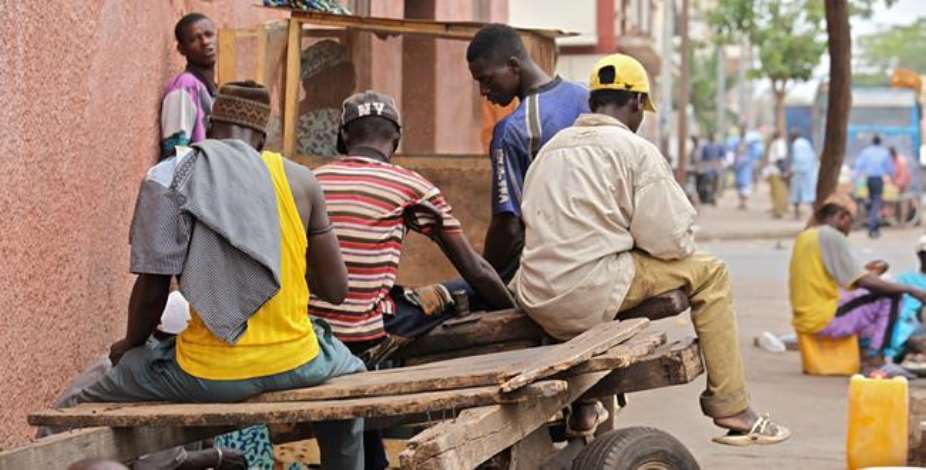High unemployment rate is said to be the most critical problem facing the country currently. It is for this reason that a lot of Ghanaians have called on Government to institute policy reforms that will speed up the rate of transmission of growth impulses into improved living conditions so that they could be realised by the masses, especially with respect to employment.
The latest Socio-economic and Governance Survey released by the Institute of Economic Affairs (IEA), which made this known, also said addressing issues of the economy was another area of concern to Ghanaians.
'It is also the area in which the government performed least according to our survey results,' Dr John Kwakye, a Senior Economist at IEA, told journalist yesterday at a press conference.
Most critical challenges
A fifth (20 percent) of respondents considered unemployment to be the most critical. That was followed by education (12.3 percent), management of the economy (8.3 percent), electricity (7.3 percent) and roads (6.9 percent).
Other areas were water supply (6.7 percent), transportation (5 percent), health (4.6 percent), wages and salaries (4.2 percent) and poverty/destitution (4.1 percent).
About 40 percent of Ghanaians think the economy as a whole is the major problem confronting the country.
'This shows clearly that bread and butter issues are the immediate concern for respondents.'
People's living conditions
A good majority of respondents (63.3 percent) regard their current living conditions to be bad.
Only 25.2 percent indicated that their current living conditions were good.
'The results generally suggest deep economic hardship,' Dr Kwakye said.
More people in Western, Central, Ashanti and Brong Ahafo regions reported bad living conditions when compared to Greater Accra, Upper East and Upper West.
In general, urban dwellers (63.5 percent) reported worse living conditions than rural dwellers (60 percent). And this must be taken against the backdrop of generally higher cost of living in urban areas, although poverty is also lower in those places.
Government performance
Seventeen areas of concern were identified and views of respondents were solicited as to how well or badly the current government was addressing them.
Government performed poorest in 'keeping down prices' - (71.5 percent response rate). This was followed respectively by creating jobs (62.0 percent), narrowing the gap between the rich and the poor (58.2 percent) and improving the living standards of the people (57.8 percent).
Fifty-six percent of respondents believe that the current the current government is managing the economy very badly as against only 5 percent who say the government is doing well.
IEA's recommendation to Government
The IEA said that economic policies and programmes should refocus on keeping down prices, creating jobs, narrowing the gap between the rich and the poor, and improving the living standards of the people.
It further called for issues of food insecurity to be addressed.
The survey was conducted in all the 10 regions of Ghana with persons aged 18 years and above as the target population. Selected households and individuals for the survey were randomly sampled from pre-selected primary sampling units.
A total sample of 1,200 households was selected to allow for up to 20 percent non-response.
Background
The purpose of the survey was to solicit and provide information on Ghanaians' perceptions on a whole range of subjects including economic and living conditions, public safety and security, media freedom and abuse, discrimination and relations between ethnic groups, problems confronting the country and government performance, among others.
By Samuel Boadi
[email protected]





 Akufo-Addo spotted ordering chiefs to stand for his handshake
Akufo-Addo spotted ordering chiefs to stand for his handshake
 Akufo-Addo ‘disrespects’ every chief in Ghana except Okyenhene — NDC Communicato...
Akufo-Addo ‘disrespects’ every chief in Ghana except Okyenhene — NDC Communicato...
 Supreme Court clears way for dual citizens to hold key public positions
Supreme Court clears way for dual citizens to hold key public positions
 Be transparent, don’t suppress the truth – Prof. Opoku-Agyemang to Jean Mensa
Be transparent, don’t suppress the truth – Prof. Opoku-Agyemang to Jean Mensa
 ‘I won’t tell the world I was only a driver’s mate during challenges’ – Prof Jan...
‘I won’t tell the world I was only a driver’s mate during challenges’ – Prof Jan...
 We’ll prosecute corrupt officials of Akufo-Addo’s govt – Prof Jane Naana
We’ll prosecute corrupt officials of Akufo-Addo’s govt – Prof Jane Naana
 [Full text] Acceptance speech by Prof Jane Naana Opoku-Agyemang as 2024 NDC Runn...
[Full text] Acceptance speech by Prof Jane Naana Opoku-Agyemang as 2024 NDC Runn...
 Election 2024: Don’t be complacent, we haven’t won yet – Asiedu Nketia cautions ...
Election 2024: Don’t be complacent, we haven’t won yet – Asiedu Nketia cautions ...
 Election 2024: Stop fighting over positions in Mahama’s next govt – Asiedu Nketi...
Election 2024: Stop fighting over positions in Mahama’s next govt – Asiedu Nketi...
 Prof Jane Naana Opoku-Agyemang will restore dignity of vice presidency – Fifi Kw...
Prof Jane Naana Opoku-Agyemang will restore dignity of vice presidency – Fifi Kw...
